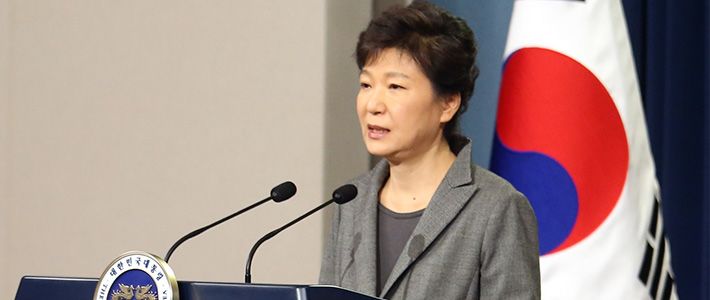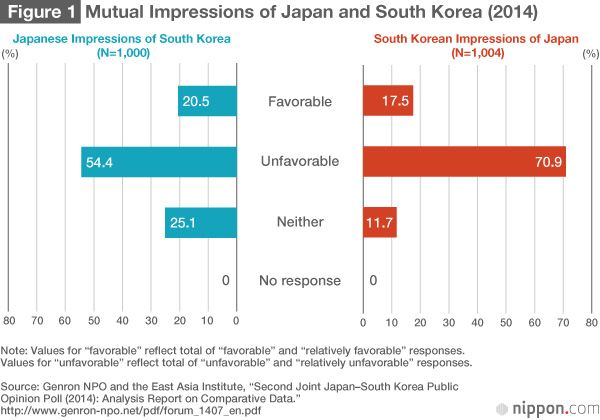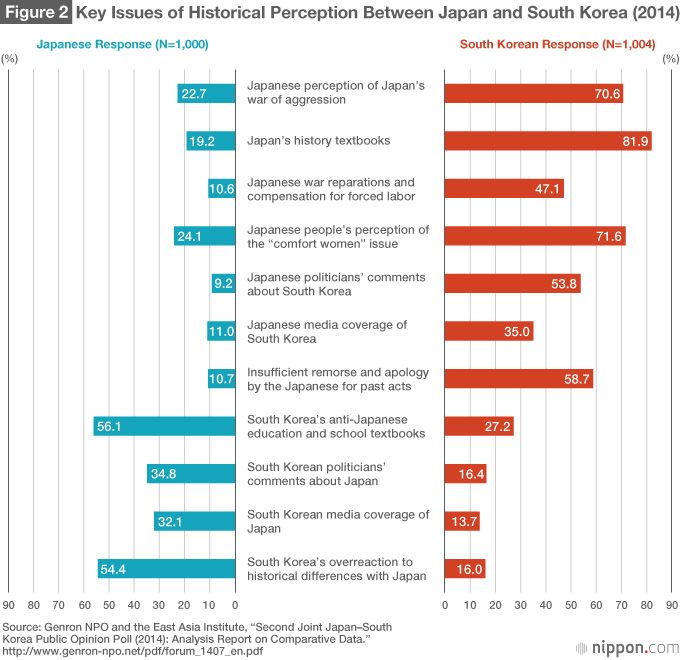
President Park and the “Sankei Shimbun”: Plenty of Blame to Go Around
Politics- English
- 日本語
- 简体字
- 繁體字
- Français
- Español
- العربية
- Русский
On July 18, 2014, the South Korean daily newspaper Chosun Ilbo ran an article by reporter Choi Bo-sik headlined “Rumors Surrounding the President.” Two weeks later, on August 3, the MSN Sankei News website posted a piece by Katō Tatsuya, then Seoul bureau chief for the Japanese daily Sankei Shimbun (currently a senior editor), under the headline “Follow-up from Seoul: President Park Missing on the Day the Ferry Sank . . . Who Was She With?”
The content of Katō’s article, which relied heavily on quotations from Choi Bo-sik’s piece, centered on rumors concerning President Park Geun-hye’s movements on the morning of April 16, following the tragic sinking of the Sewol ferry that caused the death of around 300 passengers, mostly high school students. The implication was that Park was inaccessible in the immediate aftermath of the accident—for which the government subsequently came under sharp criticism—because she was meeting secretly with a lover.
Katō’s article triggered a fierce reaction from the government in Seoul, echoed by the South Korean media and public opinion. Park’s office lodged a protest with the Sankei’s Seoul bureau, and the South Korean embassy in Tokyo demanded that the newspaper remove the article from its website, citing defamation of character. Katō was then called before the Seoul Central District Prosecutors’ Office and was barred from leaving the country during an investigation spanning several weeks. On October 8 Korean prosecutors indicted Katō without arrest for defamation under South Korea’s Act on Promotion of Information and Communications Network Utilization and Data Protection, Etc. (The law states that “any person who has defamed any other person by openly alleging false statements over information and communications networks” shall be subject to a maximum penalty of 7 years in prison, 10 years’ disqualification, or 50 million won—about $45,000—in fines.)
Backlash from Japan
These actions by South Korean officials met with escalating criticism not only from Japan but from media organizations worldwide. Eventually even representatives of the South Korean media began protesting Katō’s treatment.
Within Japan, critics of the indictment have raised three basic points. First, they have criticized the application of defamation laws to the president, who, as the nation’s top public figure, is inevitably the subject of criticism and speculation. A closely related argument is that the indictment violates the spirit of democracy, since a free press performs a critical function in holding political leaders accountable to the people. The third argument is that the Sankei article was based on a report previously published in the Chosun Ilbo, as mentioned above, and that it was unfair to penalize Katō without punishing Choi Bo-sik, author of the original article.
An editorial carried in the October 9 edition of the Sankei Shimbun summed up the Japanese response: “South Korea’s investigation of a foreign journalist’s reporting under domestic laws and its heavy-handed assertion of authority in the face of widespread concern from the international community are virtually unprecedented. Freedom of speech is under threat in South Korea, which styles itself a democratic nation.” The validity of this criticism cannot be denied.
On October 21 Sankei Shimbun carried the results of a public opinion poll conducted in cooperation with the commercial TV news network FNN. The poll was phrased as follows: “The Seoul Central District Prosecutors’ Office in South Korea has indicted the Sankei Shimbun’s former Seoul bureau chief without arrest on charges of defaming President Park Geun-hye. The indictment of a foreign journalist for reporting activities is virtually unprecedented. Do you think South Korea’s action is acceptable?” According to the published results, 88.5% of respondents deemed it “unacceptable,” while 4.9% called it “acceptable,” and 6.6% chose “neither.” Even allowing for some skewing of results owing to the fact that the Sankei conducted the survey, these results bespeak the intensity of the public backlash against Katō’s indictment within Japan.
Bilateral Political Context
How did the affair escalate to this point?
While a variety of factors can be cited, the most important is unquestionably the deterioration of Japan-Korea relations in recent years. Ideally, of course, prosecutors and courts should be unaffected by diplomatic relations and the climate of public opinion. But as long as prosecutors’ offices and courts are elite institutions capable of influencing the course of politics, one cannot expect complete detachment from the external environment.
Relations between Japan and South Korea have sunk to what many consider their lowest point since the establishment of diplomatic relations in 1965. Years have passed without a bilateral summit, and Japan’s image among South Koreans remains overwhelmingly negative. In the results of the Joint Japan–South Korea Public Opinion Poll conducted last June by the nonprofit organization Genron NPO, only 17.5% of South Korean respondents recorded a favorable impression of Japan, while 70% indicated an unfavorable impression (figure 1).

In reference to the historical perception gap, acknowledged as a major barrier to better Japan-Korea relations, the questionnaire asked respondents to specify the key problems that need correcting. On the South Korean side, 81.9% of respondents selected “Japan’s history textbooks,” 71.6% identified “the Japanese people’s perception of the ‘comfort women’ issue,” and 70.6% selected “Japanese perceptions of Japan’s war of aggression” (figure 2).

With these results in mind, we might do well to consider the role the conservative Sankei Shimbun has played in some of the serious issues that the South Koreans regard as pivotal to better bilateral relations. The Sankei has been the most vociferous of all Japan’s major media outlets in backing and encouraging a nationalist stance by Prime Minister Abe Shinzō on these issues, strongly supporting Abe’s December 2013 visit to Yasukuni Shrine and calling for a reexamination of the so-called Kōno statement of 1993, in which then Chief Cabinet Secretary Kōno Yōhei acknowledged that Korean women had been forcibly recruited to serve in Japanese military-run brothels during World War II. Surely this is one factor contributing to the surprisingly aggressive response of South Korean prosecutors to the Sankei article.
A Question of Journalist Responsibility
Let me repeat: The widespread criticism of South Korea’s investigation and indictment of a foreign journalist for defamation of the president is entirely justified. In my view, however, the overreach of Seoul’s public prosecutors is not the only issue here. Another problem meriting our concern is the quality of Bureau Chief Katō’s reporting.
While Katō used Choi Bo-sik’s article as his main source, the thrust of the two articles differs in that Choi’s central intent was not to “expose” the president. Certainly one may question his decision to repeat demeaning rumors in a public forum, but the main thrust of his article was criticism of President Park’s style of governing and the unpopularity of her administration. The following is translated from the newspaper’s abstract of Choi’s article.
“If the government’s management of national affairs enjoyed strong public support, there would be no room for malicious rumors to take hold. With confidence in the president collapsing, rumors of all kinds are spreading, much as lurking pathogens attack a body when its immunity is weakened. . . . Before she can accomplish national reforms, the president must first revamp her own entourage.”
As this indicates, Choi’s article focuses on serious questions regarding President Park’s ability to govern. Toward the end, it also questions her choice of aides and confidants. Choi mentions the rumors merely to illustrate the extent of the president’s problems. Clearly, it is not his intent to cast doubt on the president’s whereabouts on the day in question, let alone fuel a presidential scandal inside or outside of South Korea.
The thrust of the Sankei article is quite different. To be sure, Katō winds it up by citing Choi’s analysis of the reason for the spread of such “vulgar” rumors, concluding that “the Park administration is inexorably becoming a lame-duck regime.” But the overwhelming focus of the piece is the president’s alleged dark secrets.
As mentioned above, critics of South Korea’s action against Katō have questioned the consistency of charging the Japanese journalist with defamation while ignoring the Korean article on which Katō depended for most of his information. But this point also raises questions about journalistic quality and responsibility. In his article, Katō merely quotes the most sensational passages of Choi’s piece, while providing a bit of background for Japanese readers, without doing any significant news gathering or research of his own. The result is nothing more than secondhand gossip.
Such hearsay reporting would seem to be a violation of the Sankei Shimbun’s own journalistic ethics. Under the principle of “Accuracy and Fairness,” the Sankei’s guidelines for reporters include the following admonition: “Unfactual reports and reports lacking corroboration, even when cloaked in a veneer of objectivity, are inevitably exposed. Since such reporting destroys readers’ trust, it is suicidal behavior from the standpoint of the Sankei Shimbun. The same applies to headlines.” Is not Katō’s article a prime example of a report lacking corroboration? If he wanted to report on a scandal involving the president, he should have done his own news gathering and fact finding and waited until he had corroboration before publishing an article on the subject.
On October 9 the Japan Newspaper Publishers & Editors Association issued a statement saying “We strongly protest the [Seoul] prosecutors’ deplorable indictment and deeply lament this threat to free news-gathering and reporting activity.” While I acknowledge the necessity for such a statement, I believe we must also come to grips with the issues of journalistic responsibility raised by the content and quality of Katō’s article.
(Originally published in Japanese on November 4, 2014. Banner photo: South Korean President Park Geun-hye apologizes and pledges reforms during a televised address on May 19, 2014, following the Sewol ferry disaster. © Yonhap/Aflo.)
South Korea Park Geun-hye Seoul newspaper Sankei Shimbun Seoul bureau chief Katō Tatsuya